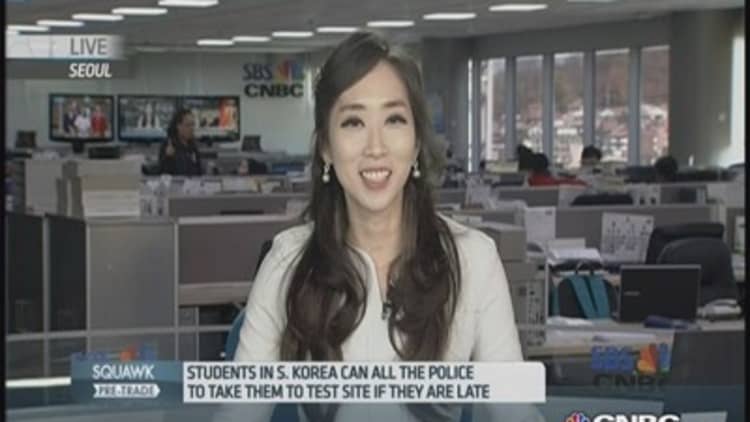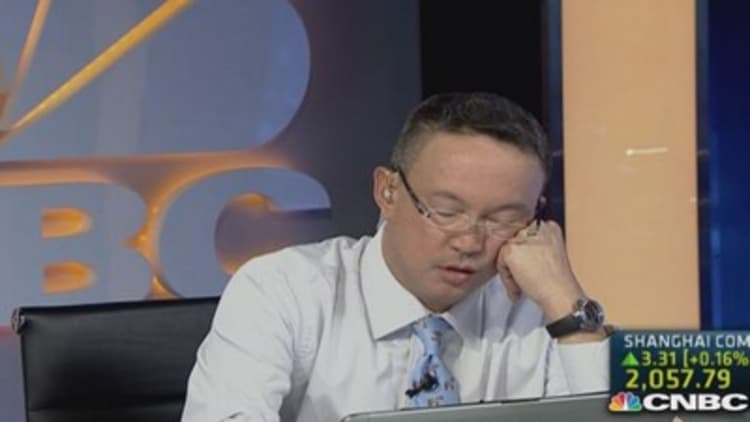It's been a year since Seoul media and communications student Lee Woong-hee finished his studies, but the 26-year-old plans to skip his class graduation ceremony in February because he thinks retaining his student status will help him finally land a job.
He's not alone. Youth unemployment hit a 14-year high in South Korea in 2014, and with hiring sluggish amid a weak economy, especially for "good" jobs with permanent status, thousands of students due to graduate in early 2015 are expected to instead remain on campus.
"Job hunting gets harder every year. It was difficult this year and I fear it will get worse next year," said Lee, who should have graduated last February.
In South Korea, many universities allow students to remain enrolled and use college facilities, even if they aren't taking any classes. At others, students deliberately remain one or two credits short of a degree until they find a job.

"I heard from others that employers do not like graduates. They ask at interviews what you did after graduation," Lee said.
Two-thirds of South Koreans aged 25-34 have a college degree, the highest proportion in the Organization for Economic Cooperation and Development (OECD), a developed nations' club among whom the average is just below 40 percent.
Government efforts in recent years to encourage young people to pursue necessarily require a university degree have had limited success in a country obsessed with education. The high rate of graduates means many ambitious young people feel overqualified for the jobs that are available to them, and figure it's better to have no job than one below their expectations.
Labor market divide
South Korea's labor market is divided between permanent jobs with a high degree of security and temporary positions that end after two years, a split that makes it harder for young people to get on a career track.
In 2012, 24 percent of workers in South Korea were temporary, double the OECD average.
In November, Finance Minister Choi Kyung-hwan suggested measures to make the labor market more flexible by easing rules on lay-offs and pay. While employers supported the proposals, labor groups and many students did not.
Read MoreForget exams, jobs a bigger worry for Korean youth
A hand-written letter to Choi by a group calling itself "the Misfits" took issue with his ideas and went viral on social networks after it was posted on walls at Korea University and Yonsei University, two of the country's top colleges.
"We are not angry because the regular workers are overly protected. We are angry because temporary workers are not ensured the benefits regular workers receive," it said.
Kim Jong-jin, a research fellow at the Korea Labor and Society Institute, said many young people in highly educated South Korea were unwilling to take temporary jobs.
"People in their mid-20s are supposed to be active in the labor market, but the market cannot exploit them as they keep on studying and preparing themselves for more stable jobs."

A government survey of 33 universities last year found the number of students delaying graduation more than doubled in three years, to more than 15,000.
Shorter careers
Corporate Korea, which makes two big rounds of hiring each year - the next is in March - has just endured its toughest year since the global financial crisis.
"As conditions are difficult for expanding investment, it won't be easy for firms to hire new people," said Lee Cheol-heng, head of the employment and labor policy team at the Federation of Korean Industries.
The unemployment rate for people aged 15-29 hit 10.9 percent in February 2014, just short of the all-time high of 11 percent recorded in January 2000, before easing to 8.0 percent in October. The figure excludes students. The unemployment rate for new graduates in March last year tied 2013's record of 32.2 percent, according to Korea Labor Institute data.
Later entry into the job market accelerates the graying of the workforce in the world's fastest-ageing country.
Last year, the number of South Korean workers in their 50s outnumbered those in their 20s for the first time, which will add pressure to the country's underfunded pension system when those older workers retire.
With young South Korean men required to serve two years in the military, more time on campus means even fewer working years in a country where the retirement age is 60. A later career start often means starting families later, exacerbating a low birth rate.
"With a retirement age, if the youth enter the labor market later, it decreases their entire economic output whereas the education investment increases," said Kim Gwang-suk of the Hyundai Research Center. "It is a serious problem."

